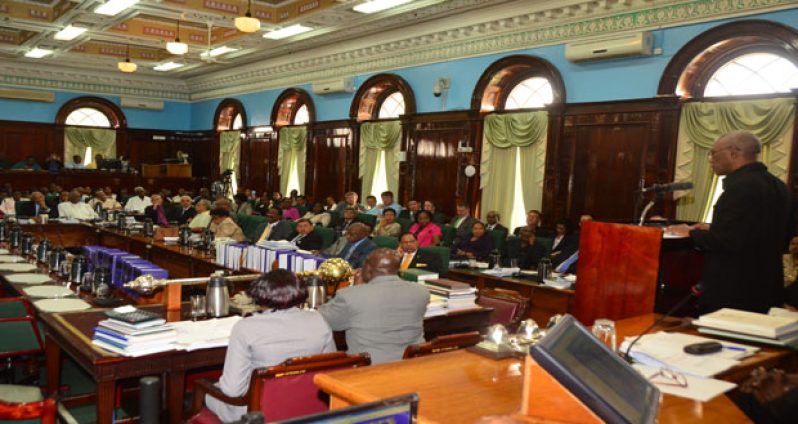PRESIDENT David Granger in his address to the National Assembly yesterday on the Venezuela border issue denounced that country’s description of Guyana’s maritime boundaries as “Integral Maritime Defence Zones” in its recent decree, noting that “there continues to be a threat of force in these areas.”There has been much speculation on the intent of Venezuelan President Nicolas Maduro’s most recent decree, but President Granger highlighted its basic tenet.
“While the new decree (No.1859) does not contain the coordinates of the decree No. 1787, it does contain a general description of all defence zones with the description of the Eastern, Central, and Western regions, remaining consistent with previous versions of the new decree.”
While rejecting Venezuela’s claim to Guyana’s waters as defence zones, President Granger said the decree “goes on further to state that these defence zones are spaces created to plan and execute integral defence operations.”
AGGRESSION AGAINST GUYANA
“We consider decree 1787 as constituting an act of aggression against Guyana,” President Granger noted. The Head of State recalled his recent trip to Barbados for the 36th CARICOM Heads of Government meeting, and a recent visit to Guyana, where Commonwealth Secretary General Kamalesh Sharma expressed solidarity with Guyana from the 53-nation Commonwealth.
“The matter is to be discussed at the Commonwealth Foreign Ministers Meeting in New York in September,” President Granger continued. During the CARICOM Summit in Barbados, the President met with United Nations Secretary General Ban Ki-Moon who “committed to sending a mission to both Venezuela and Guyana.” The President expressed his willingness to accept that group delegated by the UN Secretary General.
“The decree, of course, violates the word and spirit of the 1966 Geneva Agreement that forbids the claiming of new territory while the agreement remained enforced,” President Granger maintained.
He further explained in the words of Article 5, “no new claim or enlargement of an existing claim to territorial sovereignty in those territories shall be asserted while this agreement is in force, nor shall any claim whatsoever be asserted otherwise than in the mixed commission, while that commission is in being.”
The Guyana-Venezuela issue has been like a sleeping volcano spanning across decades, but Venezuela’s new claims, according to President Granger, goes far beyond the previous claims of Essequibo and its maritime boundaries and now extends to the maritime space of Demerara, and even part of Suriname’s maritime space.
In defence of its claim, the Venezuelan Government has made many attempts over the years to challenge economic activities in the Essequibo Region and waters associated with it. “The Venezuelan Government had no right, either under the Geneva Agreement or international law, to oppose exploratory activities by Exxon Mobil and its subsidiary Esso Exploration and Production Guyana Limited in the Stabroek Block off of the coast of Demerara.
CONTRARY TO INT’L LAW
“Guyana has full and undeterred authority to unilaterally explore and exploit the living and non-living resources within its jurisdiction,” President Granger declared, adding, “Any objection is contrary to international law.”
On this note, President Granger recalled the actions of the Venezuelan Government, through that country’s Foreign Minister Delcy Rodriguez, in February, of writing to the Country Manager of the Exxon Mobil’s subsidiary to object to the dispatching of a rig to proceed with petroleum exploration in accordance with a concession grant from the Guyana Government.
The President said that in face of “acts of aggression” by Venezuela, Guyana continues to utilise international law to strengthen its territorial integrity. “Guyana has never used aggression against any state. Guyana has always embraced the principle of the peaceful settlement of disputes.
He cautioned, however, that “in as much as we are a peace-loving nation, we will not allow our territorial integrity to be threatened or violated” since “Guyana has long recognised that Venezuela’s territorial claim has hindered the development of all five of its Essequibo Regions through lost foreign investment and blocked projects.”
ExxonMobil continues to explore in Guyana’s waters, President Granger noted, under the 1986 Petroleum Exploration and Production Act, the Maritime Boundaries Act under Order No. 19 of 1991, declaring the country’s Exclusive Economic Zone.
Following his July 6 address to Venezuela’s National Assembly, President Maduro issued the contentious decree, which provides no coordinates for patrol by Venezuela’s Navy, even in Guyana’s waters, adding to the Spanish-speaking country’s ongoing claim of 156,000 square kilometres in the Essequibo Region.
DIPLOMATIC OPTIONS
While Vice-President and Foreign Affairs Minister Carl Greenidge is slated to attend the high-level Commonwealth meeting in September in New York, President Granger gave assurance to the National Assembly that, “Guyana will continue to pursue a wide range of diplomatic options as our first line of defence, [and] Guyana remains resolute in defending itself against all forms of aggression.”
By Derwayne Wills




.png)









